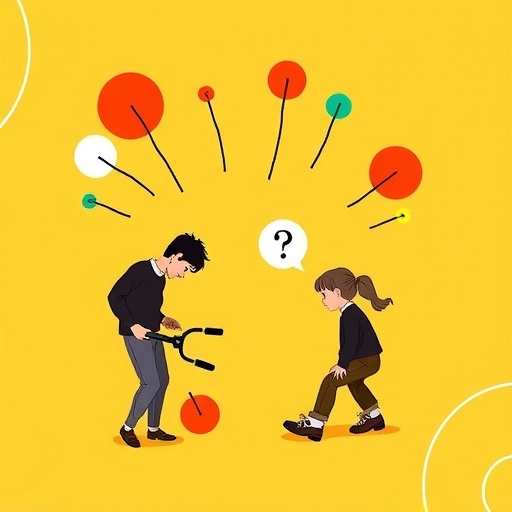In contemporary educational psychology, the exploration of learning from erroneous examples has gained significant traction among researchers and practitioners alike. The recent systematic review by Dieterich, Rumann, and Rodemer sheds light on vital conditions necessary for learners to benefit from incorrect examples as part of their educational journey. This approach underlines a paradigm shift from traditional instruction methods to ones that embrace errors as learning tools, suggesting that mistakes can catalyze deeper understanding and retention of knowledge.
Through their investigation, the authors delve into the cognitive mechanisms that enable learners to draw constructive insights from erroneous examples. They contend that the mere presentation of incorrect information is insufficient. Instead, specifying particular contexts and pedagogical strategies is essential to ensure that learners engage actively with these errors, fostering a critical evaluation of their thought processes. The systematic review synthesizes a range of studies demonstrating that when learners are prompted to analyze failures, they are more likely to reflect on their existing knowledge structures, leading to enhanced learning outcomes.
Moreover, the authors highlight the significance of tailored feedback in conjunction with erroneous examples. Feedback serves as a corrective mechanism that guides learners in recognizing the discrepancies in their understanding, thereby enhancing the learning experience. This is particularly important in complex subjects where misconceptions may easily propagate if left unaddressed. The authors emphasize that feedback should not only correct the error but also encourage learners to explore the underlying principles that resulted in their misunderstanding.
Another essential factor identified in the paper is the motivation level of learners when engaging with erroneous examples. The authors argue that motivation plays a critical role in how learners perceive and respond to mistakes. Intrinsically motivated students are more likely to view errors as opportunities for growth, whereas those with lower motivation may become discouraged. This insight prompts educators to cultivate an environment that promotes a growth mindset, encouraging students to embrace difficulties as stepping stones to mastery.
The review further categorizes the types of erroneous examples that can be utilized effectively in educational settings. By differentiating between types of errors—such as conceptual misconceptions, procedural errors, and factual inaccuracies—the authors provide a framework for educators to select appropriate examples that align with their learning objectives. This contextualization ensures that students engage with examples that are relevant to their current knowledge, enhancing the potential for learning.
Furthermore, the review discusses the role of metacognition in learning from errors. The authors argue that fostering metacognitive skills, such as self-regulation and self-assessment, can empower learners to take ownership of their educational processes. By encouraging students to think about their thinking, educators can help them develop strategies to analyze their mistakes critically, leading to more profound learning experiences.
In addition to metacognition, the review emphasizes the importance of collaborative learning environments when working through erroneous examples. The authors cite evidence suggesting that peer discussions around errors can lead to richer insights and a more thorough exploration of concepts. Collaborative dialogue allows learners to confront their misunderstandings together, offering various perspectives that can deepen understanding and facilitate cognitive restructuring.
The systematic review also addresses the implications for technology-enhanced learning environments. As education increasingly incorporates digital tools, the authors advocate for the integration of features that support learners in interacting with erroneous examples. This could include interactive simulations that allow students to manipulate variables and observe outcomes, thus gaining insights from mistakes in a controlled environment. The efficacy of such platforms hinges on their design, ensuring that they encourage reflection, exploration, and discussion.
In contemplating the broader implications of these findings, the authors suggest that educational curricula should be revised to incorporate erroneous examples more deliberately. This integration requires collaboration among educators, curriculum designers, and psychological researchers to establish best practices that empower learners to engage with errors constructively. The authors call for an educational culture that views mistakes not as failures but as integral components of the learning process.
Conclusively, the systematic review by Dieterich, Rumann, and Rodemer offers substantial insights into the multifaceted nature of learning from erroneous examples. By identifying the conditions that enhance effective learning, they contribute to a growing body of literature that recognizes the value of mistakes in education. Their findings encourage educators to rethink how they approach errors in the classroom, ultimately fostering a richer and more resilient learning experience for students.
As the field of educational psychology continues to evolve, further research into this area holds promise for uncovering additional strategies and conditions that can optimize learning from errors. The ongoing exploration of these themes will undoubtedly shape future educational practices, preparing learners to navigate a world where understanding and growth are inextricably linked to overcoming challenges.
By changing the narrative around mistakes and focusing on the valuable lessons they can teach, educators may ignite a newfound enthusiasm for learning among students, ultimately leading to more effective and enduring educational outcomes.
Subject of Research: Learning from erroneous examples
Article Title: Conditions for Effective Learning from Erroneous Examples: A Systematic Review
Article References:
Dieterich, S., Rumann, S. & Rodemer, M. Conditions for Effective Learning from Erroneous Examples: A Systematic Review.
Educ Psychol Rev 37, 94 (2025). https://doi.org/10.1007/s10648-025-10071-x
Image Credits: AI Generated
DOI:
Keywords: Learning from mistakes, erroneous examples, cognitive mechanisms, feedback, motivation, metacognition, collaborative learning, technology-enhanced learning, educational practices




